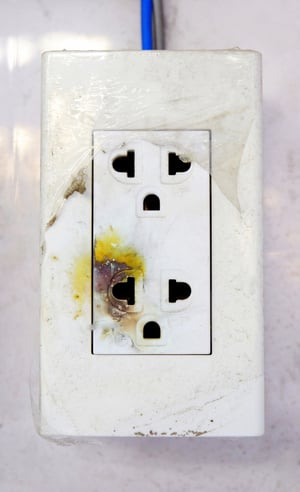
Approximately 2,000 electrical fires occur in homes across America every month. These are typically caused by faulty wiring, cords, plugs, lighting fixtures, surge protectors, and meter boxes, according to the U.S. Fire Administration. However, a fire can be prevented by heeding these signs of an electrical problem:
Outlet and Switch Problems
Be aware that outlets and switches should never:
- Display scorch marks
- Emit a burning odor, smoke or sparks
- Feel warm to the touch
- Make strange sounds, especially crackling, buzzing or popping sounds
- Move around or feel “jiggly”
- Send a tingling sensation or shock through your fingers or hand
None of these warning signs should be taken lightly. If you notice any of these indicators, unplug any electronics, turn off the circuit breakers and call a licensed electrician to inspect the outlet or switch to make the necessary repair.
Other Warning Signs
Other issues may come to your attention. These should also be treated as electrical emergencies:
- Aluminum wiring, which is especially prevalent in homes built from the early 1950s to the late 1970s. Aluminum can overheat, which is why it’s best to switch to copper wiring.
- Circuit breakers that trip frequently – a sign that your circuits are overloaded or a short exists in the wiring, which is a significant fire hazard. If this occurs consistently, call your electrician right away.
- Excessively tangled wiring. Electricians must occasionally cram wires into tight spots. But the wires should still be discernible and not piled on top of one another in a thick heap. If you uncover wiring that looks like it was haphazardly installed, contact an electrician to inspect them.
- Lights that dim or flicker. This often indicates a problem with the fixture, wiring or circuit. Don’t delay an electrical inspection if this is occurring in your home.
- Mice. In addition to posing a health hazard, mice love to gnaw on electrical wires until they're bare. Exposed wires can overheat and spark, causing a fire. If you find mouse droppings in your home, you should have your electrical wiring checked, as well as contact an exterminator to eliminate the problem.
- Ungrounded outlets, or those that accommodate only two-prong plugs, in your bathrooms, kitchen, laundry room, and anyplace else you use water. These outlets should be upgraded to ground fault circuit interrupters (GFCIs) to eliminate the risk of shock and fire.
These conditions can indicate a serious electrical problem in your home. Before moving into a new home, you should have an electrician thoroughly inspect your home for these issues. If you notice any of these signs, whether you’ve just moved in or have lived in your home for years, contact an electrician right away to eliminate the risk of a fire. For more home maintenance best practices, read here:
















